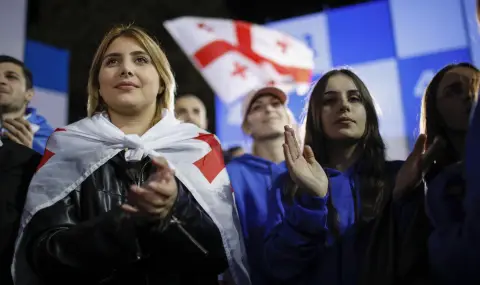After the "Georgian Dream" party was declared the winner of the country's elections, Georgia fell into a kind of stalemate. The opposition and the country's president are convinced that the elections were rigged. The West says the same almost directly. However, a partial recount of votes confirmed the victory of the ruling party. It did not lead to "a significant change in the previously announced official results," the election commission told AFP.
This is not surprising. On the eve of the elections, the Georgian authorities declared all those who oppose them as enemies of the people and Georgia, thus cutting off the path to any possible compromises.
But a compromise between the government and the opposition is the only optimal way out for Georgian society and the state in this situation. It does not matter whether it will be achieved through the mediation of the West, President Zurabishvili, Hungarian Prime Minister Orban or Armenian Prime Minister Pashinyan.
Only in this way can the most obvious falsifications be denounced and a new parliament be formed in which the opposition will be fairly represented, as well as a new government be formed. Of course, it will also be a compromise, for example, with the participation of representatives of all parties and blocs that have entered the parliament. However, it is unlikely that the founder and informal leader of "Georgian Dream" Bidzina Ivanishvili and his opponents will agree to such an option. Western pressure will not help either.
Forced redistribution of power
The alternative to compromise would be an attempt by the opposition to force the authorities to admit the falsifications and step down. This is possible only with sufficiently strong external influence and mass protests inside Georgia, for which, however, there are still not enough social reasons. "Georgian Dream" in turn will hold on to power until the end, knowing full well that otherwise some will have to escape abroad or go to prison.
However, it must be realized that mass protests would open up opportunities not only for the pro-Western opposition, but also for pro-Russian forces, which are actually not very popular in Georgia. Openly pro-Russian parties did not enter the Georgian parliament. Ivanishvili has concentrated all the threads of relations with the Kremlin in his hands and is trying to maneuver so as not to become completely dependent on Russia.
But let's imagine hypothetically that "Georgian Dream" loses the battle in a strong confrontation with the opposition, the power is shaken, which leads to general instability in the country. Will Ivanishvili then ask for help from his Russian partners? And will Russia, taking advantage of this instability, try to interfere in the internal affairs of Georgia – as in Kazakhstan in 2022? Such a scenario could lead to the complete dependence of the Georgian authorities on Russia, as happened with the Lukashenko regime in 2020.
But even more dangerous is the Ukrainian scenario, which "Georgian Dream" is using to scare voters before the elections, and which could become a reality in the event of Ivanishvili's defeat. Even if at first there is no talk of a full-scale aggression like against Ukraine in 2022, it is very likely that it will lead to an invasion on the model of 2014, the leadership of the state will flee to Rostov-on-Don, and parts of Georgian territory will be torn away from the country.
Kremlin-backed dictatorship
The third possible scenario is certainly favorable for Russia: Ivanishvili retains power on his own terms - without compromises, but also without serious protests. This will provide the Georgian authorities with room for maneuver. Let us recall that immediately after the elections they declared that in the name of restoring the territorial integrity of the country (especially under the Kremlin's conditions) there will be no restoration of diplomatic relations with Russia.
But in such a case, Ivanishvili will have almost no other options than to obey the Kremlin. Georgia's isolation from the EU and the US, as well as the loss of chances for European integration, are almost inevitable. We can already see how cooperation with Western countries is rapidly deteriorating. And this will affect not only politics, but will certainly affect the economy as well.
The only serious alternative to trade with the EU is to strengthen ties with autocracies such as Turkey, China and, above all, Russia. In the case of Russia, the flow of sanctioned goods through Georgia will increase, which will lead to secondary Western sanctions against Tbilisi and the prospect of Georgia becoming an economic satellite of Russia.
So Ivanishvili's thirst for power is putting Georgia in a Russian trap. As some experts from Tbilisi say, the country seems to be entering a new era - a Eurasian one. In that case, Georgians will have to forget about European integration for a long time.
Author: Ivan Preobrazhensky
